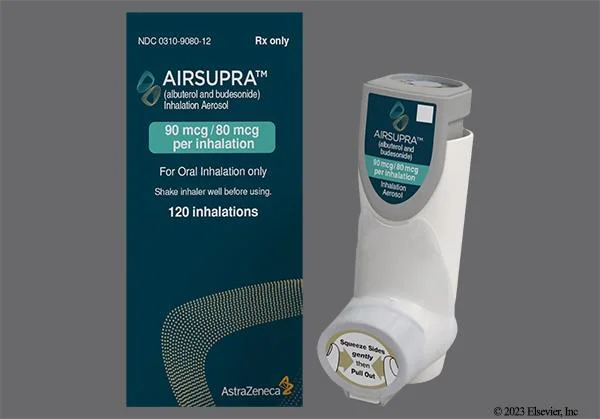WILMINGTON, Del.– New data from AstraZeneca’s Phase IIIb BATURA trial suggest that AIRSUPRA (albuterol/budesonide), an anti-inflammatory rescue therapy, may significantly improve outcomes for patients with mild asthma, compared to the long-standing standard of albuterol alone. The full trial results, now published in the New England Journal of Medicine and presented at the American Thoracic Society (ATS) 2025 International Conference, point to a potential shift in the treatment paradigm for millions of asthma patients.
The BATURA trial found that AIRSUPRA reduced the risk of severe asthma exacerbations by 47% compared to albuterol. This improvement was not only statistically significant but also clinically meaningful. Due to the strong results seen in a planned interim analysis, the trial was stopped early on the recommendation of an independent monitoring committee.
“This is a pivotal moment in asthma care,” said Dr. Craig LaForce, Medical Director of North Carolina Clinical Research. “For 50 years, patients have relied on albuterol alone for rescue relief, leaving them vulnerable to inflammation that drives severe attacks. BATURA shows AIRSUPRA not only relieves symptoms but actively reduces airway inflammation to prevent future exacerbations.”
The trial builds upon earlier results from AstraZeneca’s MANDALA and DENALI studies, strengthening the case for AIRSUPRA’s use across all asthma severities. Together, the data support updated treatment approaches aligned with global guidelines from the Global Initiative for Asthma (GINA), which now recommend anti-inflammatory combination therapies as the preferred reliever in mild asthma.
Mild asthma, which affects between 50% and 70% of asthma patients, is often underestimated in terms of risk. However, it contributes to up to 30% of asthma-related exacerbations and deaths, underscoring the need for more effective rescue therapies.
Tonya Winders, President of the Global Allergy and Airways Patient Platform (GAAPP), highlighted the impact on patients: “Many people with mild asthma underestimate their risk. AIRSUPRA transforms each use of a rescue inhaler into an opportunity to tackle underlying inflammation, reducing attacks and the need for systemic steroids.”
One key secondary outcome from the BATURA trial showed that patients aged 12 and older using AIRSUPRA had a 63% reduction in exposure to systemic corticosteroids (SCS) compared to those using albuterol alone. This is particularly significant given that even brief courses of SCS can increase the risk of serious health issues, including diabetes, cardiovascular disease, and osteoporosis.
Sharon Barr, Executive Vice President and Head of BioPharmaceuticals R&D at AstraZeneca, said the results “clearly demonstrate the superiority of AIRSUPRA over albuterol alone” and expressed hope the findings would accelerate the adoption of anti-inflammatory rescue therapies as standard treatment.
AIRSUPRA is the first and only rescue medication approved in the U.S. that combines a bronchodilator with an anti-inflammatory steroid. It is currently indicated for the as-needed treatment and prevention of bronchoconstriction and to reduce exacerbation risk in adults with asthma. The drug was approved in the U.S. based on previous Phase III studies and continues to be evaluated in adolescents through the ACADIA trial and in patients in China through the BAIYUN trial.
Safety data from BATURA showed AIRSUPRA was well-tolerated, with no meaningful differences in adverse events between it and albuterol.
Co-developed by AstraZeneca and Avillion, AIRSUPRA may now be poised to redefine how asthma—especially mild asthma—is managed, offering not just symptom relief but also protection against the progression of the disease.


